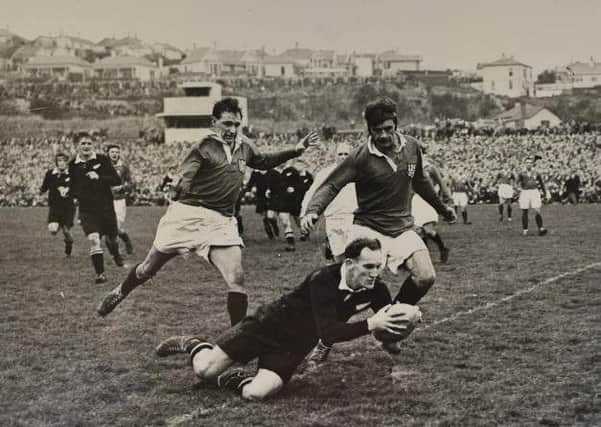Obituary: Ron Elvidge, All-Black who scored a winning try and went on to be a top gynaecologist


Ron Elvidge was, at the time of his death, just weeks after his 96th birthday, “the most-senior All Black”. He was also one of New Zealand’s leading gynaecologists.
Elvidge was an Otago man, born in Timaru in that province. He was educated at the John McGlashan College in Dunedin, a Presbyterian boarding school, named after the 19th century Edinburgh-born lawyer, politician, public servant and educationalist on whose Maori Hill estate it was founded after the First World War.
Advertisement
Hide AdAdvertisement
Hide AdFrom there, Elvidge, a second five-eight (inside centre) went to Otago Universiy to study medicine. At nearly six feet tall, and weighing just over 13 stones, Elvidge was a big man to play in his position at that time, and he quickly graduated to the Otago provincial team.
Then, on 14 September, 1946, still completing his medical training, he became All Black number 454 when he won the first of his nine New Zealand caps, in a match against the Australians, in Dunedin. The All Blacks won that one 31-8, and, two weeks later, at Auckland’s Eden Park, he scored the match-winning try in a 14-10 win over the Australians.
His studies prevented him from touring Australia with the All Blacks in 1947, while, amazingly given today’s plethora of games, New Zealand did not play any internationals in 1948. However, he was kept busy with Otago during this spell, captaining the side – as they developed their legendary hard-rucking game over a run of 18 successful defences of “the log o’ wood”, as the Ranfurly Shield is known in New Zealand.
He was captain when they took the Shield off Southland in September, 1947, and in a further 10 defences, but, injury ended his career before they lost possession to Canterbury, at Carisbrooke in August, 1950.
Elvidge was back in All Black colours for the South African tour in 1949, even taking over the captaincy from the legendary Fred Allen for the final two tests of that epic tour. He was a reluctant replacement for Allen, but he enhanced his reputation in the process and was named captain to face the British and Irish Lions, when they toured New Zealand in 1950.
While in South Africa, he was praised for the manner in which he put his medical training to good use in the aftermath of a train carrying tourists involved in an accident which took the life of the fireman on the locomotive. Elvidge and another passenger, also a doctor, spent an entire night treating the injured on-site.
The first test, in Dunedin, in which Elvidge scored a try, finished 9-9, but the All Blacks won the second, 8-0 in Christchurch and the third 6-3 in Wellington. That third test proved to be Elvidge’s final game. He broke his collarbone and sustained a facial injury which required four stitches, but, with no substitutes back then, when the All Blacks were reduced to 13 men, he bravely went back onto the park, to crash over in the corner for the only try of the game, to give his side a 6-3 win. Earlier in that tour, he had led Otago to a game-changing 23-9 win over the Lions. The manner in which the Otago pack rucked as one unit in that game revolutionised rugby.
Elvidge was just 27 when his playing career ended. In all he played barely 60 first-class matches when he hung up his boots. He revealed, in an interview to mark his 94th birthday, that he had more fun playing with his university friends in club games than in representative matches for Otago or internationals with the All Blacks. “Far less pressure,” he observed.
Advertisement
Hide AdAdvertisement
Hide AdWhen the time came to decide on his medical speciality, he opted for obstetrics and gynaecology, moving to Auckland and becoming one of the foremost practitioners of his speciality in New Zealand – and bringing one or two future All Blacks into the world along the way.
He enjoyed a long, contented retirement with wife Dawn, who survives him with their children and grandchildren.
MATTHEW VALLANCE